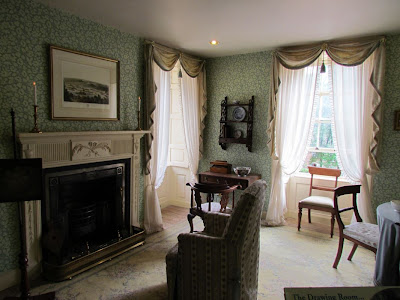Today we started the day with a fire alarm at 6am while staying on the 6th floor, you really realise how many steps are in a building when walking back up to your building as the lift only takes 4 people at a time and waiting for that to return to your room is not an option. This is becoming a trend of the holiday as we have already had a previous fire alarm at 1am when we first arrived in London which was not too much fun with jet lag etc.
 |
| Hair brushing gets missed when exiting on a fire alarm |
We drove to Paisley this morning where the material was first made and became famous and saw the Abbey which was where William Wallace was educated by the monks. Paisley Abbey's origins date back to the 12th century and it is recognised as the cradle of the Royal House of Stewart. Paisley Abbey was set up on the site of an old Celtic church by 13 monks. In the 13th century, the original priory was raised to the status of an abbey and dedicated to four saints, including the local St Mirin who brought Christianity to this area in the sixth century. The abbey became wealthy due to extensive trade with commercial centers in Europe.
 |
| Place of Paisley (Domestic building of the Abbey) |
 |
| Paisley City Chambers |
 |
| William Wallce |
Our next stop was an amazing stop at New Lanark World Heritage Village. Telling the fascinating story of the cotton mill village of New Lanark which was founded in the 18th century. New Lanark quickly became known under the enlightened management of social pioneer, Robert Owen. A man way ahead of his time who believed in equality for woman, education for all children and so much more. He provided decent homes, fair wages, free health care, a new education system for villagers and the first workplace nursery school in the world! Now a UNESCO World Heritage Site, New Lanark has been beautifully restored as a living community. The buildings of the Robert Owen's School for Children, Millworkers' House in 1820s and 1930s Robert Owen's House Village Store and Working Textile Machinery are all displayed from the time to give you a real sense of what happened in the village at the time. Surrounded by native woodlands planted by him for the pleasure of his workers and with the famous Falls of Clyde which provided free energy to run the mill with the water wheel all available for viewing.


 |
| The working mill today |
 |
| The really large school room which had anywhere from 30 - 80 pupils at a time. |
Many ideas expressed by Robert Owen (1771-1858) remain amazingly relevant and topical today. The international cultural influence of his campaign for a better and fairer society still should be adopted today. "What ideas individuals may attach to the term "Millennium" I know not; but I know that society may be formed so as to exist without crime, without poverty, with health greatly improved, with little, if any misery, and with intelligence and happiness increased a hundredfold: and no obstacle whatsoever intervenes at this moment except ignorance to prevent such a state of society from becoming universal".
He believed that children up to the age of 10 should be in school both girls and boys, this was a long school day having breaks for breakfast and lunch, subjects included history, mathematics, literacy, dancing, music, geography and nature. He spared no price to provide the children with equipment, paintings, uniforms were also provided and washed every three days along with the children. In other mills at the time, the children much younger than 10 would work incredibly long days with no time for learning or recreation. With the children in school the parents were free to go to work for him in the mill. His first priority was the education of the children, he also paid them in tokens as well as money for the purchase of food, clothes etc from his store which provided better quality produce for cheaper prices than other wise available from other vendors of the time that the people at first were in debt to.
The workers could also attend the school in the evenings after there work if they wished free of charge. He was considered to be firm but a fair employer, who did not believe in corporeal punishment and in rewards instead. The aged and the sick were cared for as Robert charged 1/60th of the wage for the health care.




























No comments:
Post a Comment